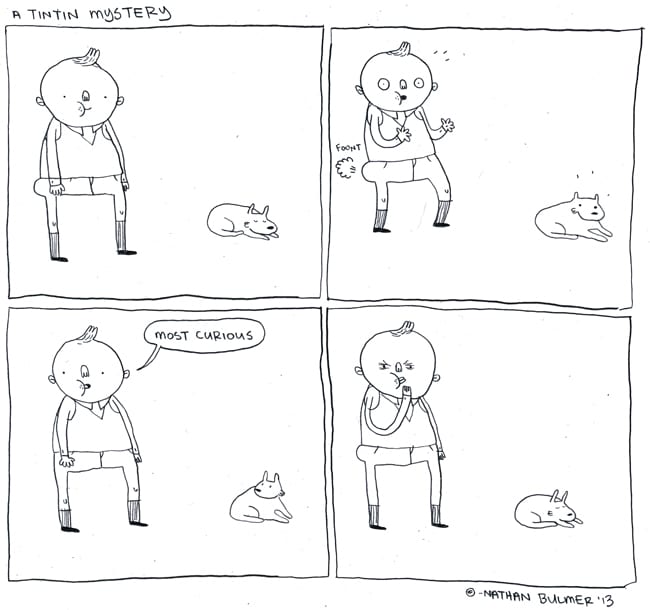 While Nathan Bulmer is here, Abhay Khosla took a break from this week's news, for a standing engagement as comics reviewer over at the Savage Critics--this week alone, he wrote about Scarlet, Snapshot, Non-Humans, Where Is Jake Ellis and Guardians of the Galaxy. Take a look at 'em. Come back if you've got the time.
While Nathan Bulmer is here, Abhay Khosla took a break from this week's news, for a standing engagement as comics reviewer over at the Savage Critics--this week alone, he wrote about Scarlet, Snapshot, Non-Humans, Where Is Jake Ellis and Guardians of the Galaxy. Take a look at 'em. Come back if you've got the time.
 I have been spending a lot of time watching television recently. I'm not sure the of titles of the shows I've been watching, because my Spanish is rusty to the point where it feels dishonest to use the phrase "my Spanish." I've been at the laundromat, and while I bring magazines and books and check my phone and wear headphones, I find it difficult not to stare at the television that's hoisted up in the corner of the room, babbling images of terrifying looking old women ladled in garish jewelry who fight incessantly with young women and fat men and in one particularly memorable instance, their own memory. (She had a heart attack, which means memory won, I think.) There are obnoxiously shouty commercials where attractive men turn in slow motion while Monday Night Football style visual effects explode behind wry smiles. There's a game or talk show populated by the happiest people I've ever seen on television, people who beam and laugh and cry on a level that's at first laughable and then, as the wash cycles roll by, deeply enviable. I wouldn't say I look forward to these shows, because I keep bringing things to read, assuming this is the week I'll fight the temptation to stare, but it didn't take very many trips before I started to respect these shows, a whole lot more than I would have expected to. They're well-made entertainments, built around very base, very broad concerns: sex, money, violence, family. The people in the fictional stories are trying to get ahead, with some relying on hard work, and others relying on trickery. Love seems important, although loyalty is what they talk about most. The game and talk show hybrid relies more heavily on schtick, with the humor usually coming via very feminine fat men; the women give it to you straight, while dressed just on the classy side of risque.
I have been spending a lot of time watching television recently. I'm not sure the of titles of the shows I've been watching, because my Spanish is rusty to the point where it feels dishonest to use the phrase "my Spanish." I've been at the laundromat, and while I bring magazines and books and check my phone and wear headphones, I find it difficult not to stare at the television that's hoisted up in the corner of the room, babbling images of terrifying looking old women ladled in garish jewelry who fight incessantly with young women and fat men and in one particularly memorable instance, their own memory. (She had a heart attack, which means memory won, I think.) There are obnoxiously shouty commercials where attractive men turn in slow motion while Monday Night Football style visual effects explode behind wry smiles. There's a game or talk show populated by the happiest people I've ever seen on television, people who beam and laugh and cry on a level that's at first laughable and then, as the wash cycles roll by, deeply enviable. I wouldn't say I look forward to these shows, because I keep bringing things to read, assuming this is the week I'll fight the temptation to stare, but it didn't take very many trips before I started to respect these shows, a whole lot more than I would have expected to. They're well-made entertainments, built around very base, very broad concerns: sex, money, violence, family. The people in the fictional stories are trying to get ahead, with some relying on hard work, and others relying on trickery. Love seems important, although loyalty is what they talk about most. The game and talk show hybrid relies more heavily on schtick, with the humor usually coming via very feminine fat men; the women give it to you straight, while dressed just on the classy side of risque.
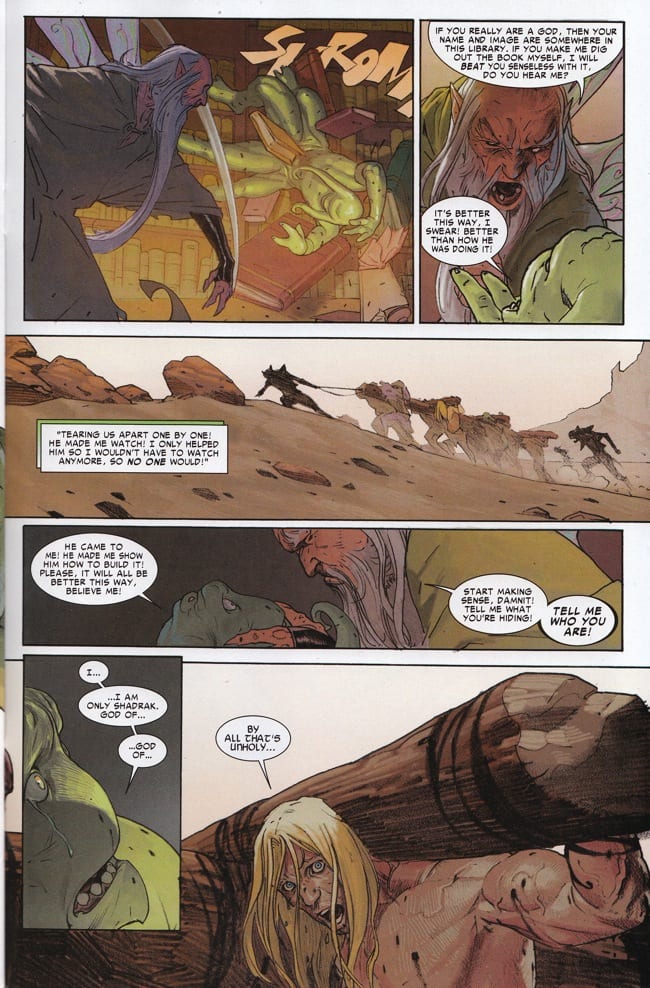 I don't respect these shows as art, but they don't want me to. They just want me to pay attention, and while my own ignorance keeps me a bit removed, they're incredibly successful at doing that.
I don't respect these shows as art, but they don't want me to. They just want me to pay attention, and while my own ignorance keeps me a bit removed, they're incredibly successful at doing that.
 While I haven't read every issue of Jason Aaron's Thor: God of Thunder title, my general feeling about the issues I have read is that it's working the same angle as those laundromat masterpieces. It's an engaging piece of entertainment that is clever enough to coast through the necessary cliches that come with being one of 900 appearances of a character who will always solve his problems by eventually hitting them with a hammer, and it has enough moments of visual appeal to offset the occasional wrong note that Marvel's sped-up production process can't help but create. It's a good superhero comic, but not a great one, whether you're defining great by innovative newness or seamless refinement. I imagine it's like Game of Thrones, although I've never seen that: something that's fun to keep up with and be startled by, even if none of what it ends on is really that fun or even particularly startling. How it goes about what it does is what keeps one at attention, because in the same way that you know that a Thor comic will eventually see Thor squaring circles with his hammer, you pretty much know what's going to happen when a television show hits those final episodes.
While I haven't read every issue of Jason Aaron's Thor: God of Thunder title, my general feeling about the issues I have read is that it's working the same angle as those laundromat masterpieces. It's an engaging piece of entertainment that is clever enough to coast through the necessary cliches that come with being one of 900 appearances of a character who will always solve his problems by eventually hitting them with a hammer, and it has enough moments of visual appeal to offset the occasional wrong note that Marvel's sped-up production process can't help but create. It's a good superhero comic, but not a great one, whether you're defining great by innovative newness or seamless refinement. I imagine it's like Game of Thrones, although I've never seen that: something that's fun to keep up with and be startled by, even if none of what it ends on is really that fun or even particularly startling. How it goes about what it does is what keeps one at attention, because in the same way that you know that a Thor comic will eventually see Thor squaring circles with his hammer, you pretty much know what's going to happen when a television show hits those final episodes.
 The apotheosis of this sort of entertainment is always going to be something like television--video games and comics require more participation, and TV's highest goal will always be to take over where your light bulb leaves off, with passive entertainment becoming full utility. But if there was a runner-up to the television shows that are numbly pumped in, it would be the comics work of Mark Millar, a man who has pursued the refinement of shlock so far that he no longer needs to hide behind corporate characters. Instead, he can count on an audience that will always know exactly who he's making fun of or referencing or calling out, building entire moneyed franchises out of characters he no longer even needs to get the rights to. (Millar's Nemesis, a character that nearly ended up in the hands of the now deceased filmmaker Tony Scott, was once described by the writer with the phrase, "What if Batman was a total cunt?") Secret Service--Millar's hybrid of spy fiction and Joss Whedon-style nerd-culture reference porn--limped to its conclusion this past week, its back page chortling to itself about the movie adaptation, "already in the works."
The apotheosis of this sort of entertainment is always going to be something like television--video games and comics require more participation, and TV's highest goal will always be to take over where your light bulb leaves off, with passive entertainment becoming full utility. But if there was a runner-up to the television shows that are numbly pumped in, it would be the comics work of Mark Millar, a man who has pursued the refinement of shlock so far that he no longer needs to hide behind corporate characters. Instead, he can count on an audience that will always know exactly who he's making fun of or referencing or calling out, building entire moneyed franchises out of characters he no longer even needs to get the rights to. (Millar's Nemesis, a character that nearly ended up in the hands of the now deceased filmmaker Tony Scott, was once described by the writer with the phrase, "What if Batman was a total cunt?") Secret Service--Millar's hybrid of spy fiction and Joss Whedon-style nerd-culture reference porn--limped to its conclusion this past week, its back page chortling to itself about the movie adaptation, "already in the works."
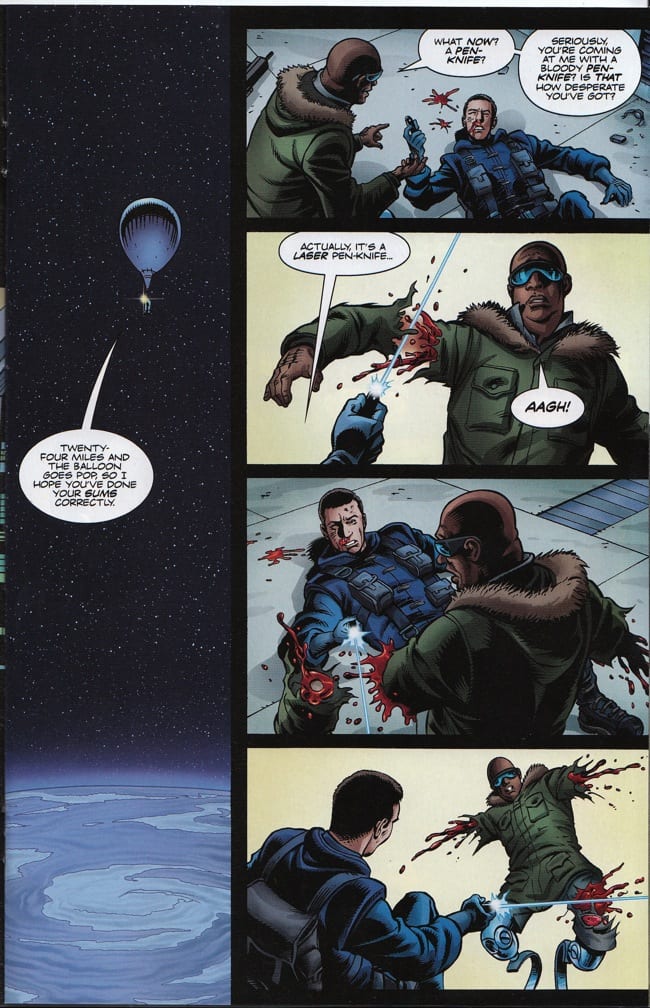 Some of it was actually funny, which shouldn't come as a surprise. Millar, more so than any of his contemporaries, is better at aping the sound and rhythm of contemporary pop culture, and while familiarity breeds contempt, the things he's familiar with aren't the boring, continuity driven superhero comics we're tired of but are instead the popular movies that haven't been picked clean yet. (What's Old Man Logan but Wolverine's Unforgiven?) Watching Millar kill Mark Hamill with a Wile E. Coyote gag may not be tasteful, but considering the audience, it's at least an imitation of audacious. And that's the flip side to Millar's trick, one he plays to in every issue of Kick-Ass--we're all in on the joke, and the joke is on people who care about comics, because look-what-just-happened-to-Luke, and boy-isn't-Batman-a-pussy. The only way this shit works is if you believe there's somebody down the street, shaking their fists in red-faced rage at what's been done to their precious ... well, whatever Millar's making fun of at the time.
Some of it was actually funny, which shouldn't come as a surprise. Millar, more so than any of his contemporaries, is better at aping the sound and rhythm of contemporary pop culture, and while familiarity breeds contempt, the things he's familiar with aren't the boring, continuity driven superhero comics we're tired of but are instead the popular movies that haven't been picked clean yet. (What's Old Man Logan but Wolverine's Unforgiven?) Watching Millar kill Mark Hamill with a Wile E. Coyote gag may not be tasteful, but considering the audience, it's at least an imitation of audacious. And that's the flip side to Millar's trick, one he plays to in every issue of Kick-Ass--we're all in on the joke, and the joke is on people who care about comics, because look-what-just-happened-to-Luke, and boy-isn't-Batman-a-pussy. The only way this shit works is if you believe there's somebody down the street, shaking their fists in red-faced rage at what's been done to their precious ... well, whatever Millar's making fun of at the time.
 It's a neat trick: everybody involved is smugly sneering at some imaginary whiner, while a silent part of you wonders why the whole thing feels so fucking empty and unfunny--aren't jokes supposed to make you laugh? And why are so may black people getting killed? Or, as the Journal's own Joe McCulloch put it: "Who in the fuck makes 'rejection of demeaning hip-hop gear' a major concluding applause line for a hero's journey in 2013? Wait, I know the answer - every adult I grew up around in the 1990s. Mark Millar: truly the Cool Uncle of comics."
It's a neat trick: everybody involved is smugly sneering at some imaginary whiner, while a silent part of you wonders why the whole thing feels so fucking empty and unfunny--aren't jokes supposed to make you laugh? And why are so may black people getting killed? Or, as the Journal's own Joe McCulloch put it: "Who in the fuck makes 'rejection of demeaning hip-hop gear' a major concluding applause line for a hero's journey in 2013? Wait, I know the answer - every adult I grew up around in the 1990s. Mark Millar: truly the Cool Uncle of comics."
 Something like Secret Service is easy to dismiss when it fails; by its nature, it wears its goal on every panel. It wants to be a movie, and these are the rough drafts for its jokes. They're making a movie? It must have worked then.
Something like Secret Service is easy to dismiss when it fails; by its nature, it wears its goal on every panel. It wants to be a movie, and these are the rough drafts for its jokes. They're making a movie? It must have worked then.
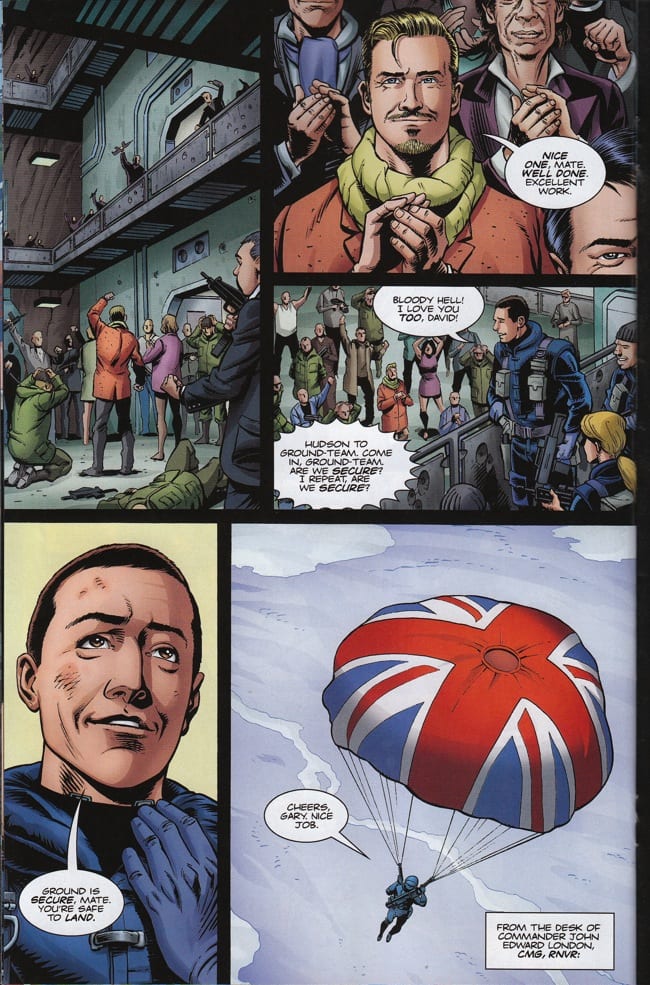 The other kind of comics then, the ones that don't even try to live up to the standards of my precious mustached Mexican cowboy commercial: the self-published, nothing-to-prove-but-proving kind. Here's one.
The other kind of comics then, the ones that don't even try to live up to the standards of my precious mustached Mexican cowboy commercial: the self-published, nothing-to-prove-but-proving kind. Here's one.
 Here's another.
Here's another.
 The first image is from The Raw Edge, published by its creator, Devin Clark. Clark's the guy responsible for Comedy Central's Ugly Americans, as well as one of the artists most responsible for the art and comics magazine Mammal. Another Mammal artist is Benjamin Marra, and while Raw Edge doesn't read as something Marra would have created, it reads like the product of someone who shares Marra's interest for better or for ... well, just better, really. It's a science fiction setting similar to what you'd find in Blade Runner, Akira, or whatever author those particular things was inspired by or stole from, populated by a bunch of hot-tempered characters going through the selfish, noir-staple motions required. The only hint that Clark might not be taking it seriously isn't found in the story or dialog--there's no real irony or winking to be found--but in the cover, where the cover logo combines a BMX Bandits font with the steel italics you'd see on a cereal box, if the cereal had some sort of industrial characters hanging out on a scaffolding. Likability goes a long way, and this one has way more than it even needs. On second thought, this is as good as my wry cowboy. Hell, it's almost better.
The first image is from The Raw Edge, published by its creator, Devin Clark. Clark's the guy responsible for Comedy Central's Ugly Americans, as well as one of the artists most responsible for the art and comics magazine Mammal. Another Mammal artist is Benjamin Marra, and while Raw Edge doesn't read as something Marra would have created, it reads like the product of someone who shares Marra's interest for better or for ... well, just better, really. It's a science fiction setting similar to what you'd find in Blade Runner, Akira, or whatever author those particular things was inspired by or stole from, populated by a bunch of hot-tempered characters going through the selfish, noir-staple motions required. The only hint that Clark might not be taking it seriously isn't found in the story or dialog--there's no real irony or winking to be found--but in the cover, where the cover logo combines a BMX Bandits font with the steel italics you'd see on a cereal box, if the cereal had some sort of industrial characters hanging out on a scaffolding. Likability goes a long way, and this one has way more than it even needs. On second thought, this is as good as my wry cowboy. Hell, it's almost better.
 Such Is Life then: the odd one out. Entertainment is a tertiary concern if it's a concern at all, although I'm a sucker for whatever you call it where the title of a comic turns into the comic's final line when you close the book and it works perfectly. This has that. Spoiler?
Such Is Life then: the odd one out. Entertainment is a tertiary concern if it's a concern at all, although I'm a sucker for whatever you call it where the title of a comic turns into the comic's final line when you close the book and it works perfectly. This has that. Spoiler?
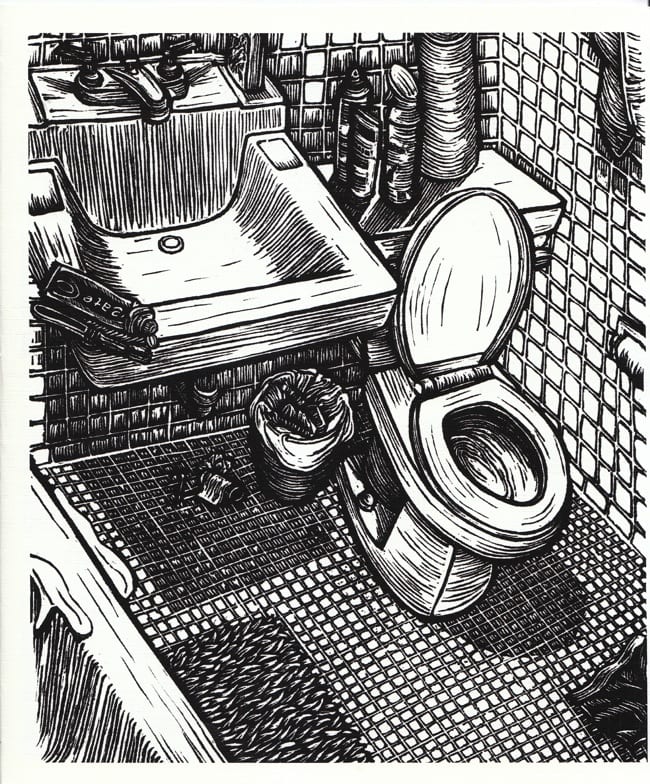 I was led to this one as being one of only two things of interest in a room full of competition, and while I think that's judging the rest of the horses harshly, me being soft doesn't mean that Kayla Jones hasn't earned some praise. Lynd Ward-like, woodcut-y comics that would lend themselves extremely well to horror (if she wanted to go that route), this wordless one-off will certainly impress anyone who happens upon it. Hopefully there's more to come.
I was led to this one as being one of only two things of interest in a room full of competition, and while I think that's judging the rest of the horses harshly, me being soft doesn't mean that Kayla Jones hasn't earned some praise. Lynd Ward-like, woodcut-y comics that would lend themselves extremely well to horror (if she wanted to go that route), this wordless one-off will certainly impress anyone who happens upon it. Hopefully there's more to come.
 In summation: are comics better than laundromat telenovelas, watched randomly?
In summation: are comics better than laundromat telenovelas, watched randomly?
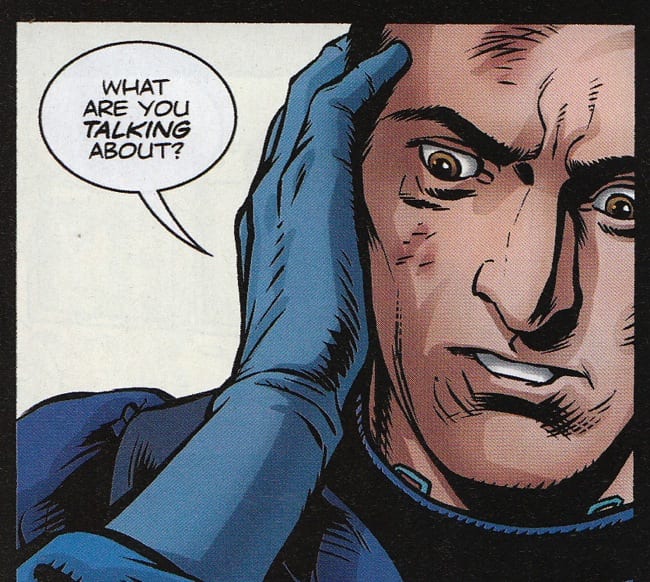 Sometimes?
Sometimes?






